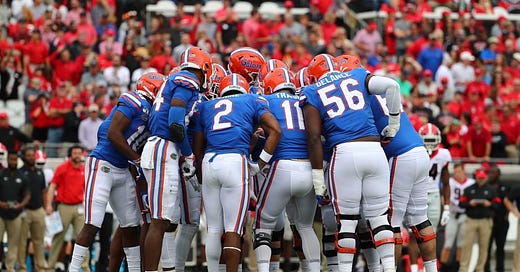Can anti-DEI laws aimed at colleges give birth to an athlete boycott?
The idea has never had more traction, particularly after it has gained notable supporters like Emmitt Smith
Over the course of his accomplished life, Emmitt Smith has been known for any number of things.
Most prominently, he was a college and NFL superstar running back, a three-time Super Bowl champion and Pro Football Hall of Famer who, 20 years after his final game, still holds the NFL career rushing record, a figure that may never be broken given the devaluation of the position and the more pass-happy schemes in the modern-day NFL. While it’s certainly up for debate, Smith has a strong argument as the greatest running back to ever play the game (something even a salty Philadelphia Eagles fan like me can admit about the former Dallas Cowboy).
Away from the field, and with his playing days behind him, he has gotten into real-estate development, won the third season of Dancing with the Stars, competed in poker championships and, in a more regrettable chapter of his life, embarked on a short-lived career as an ESPN NFL analyst.
For all Smith has done, there’s little in his biography about what he thinks and what he believes. At least publicly, Smith has spent many of his 54 years on this earth as an apolitical figure. Outside of information about his educational background and his family, the “personal life” section of his Wikipedia page only makes a brief note that he’s a devout Christian. His Twitter bio, after establishing that, yes, this is the real Emmitt Smith, lays it out succinctly: “Family, football, enterprise.”
That changed last week.
In a March 3 post on Twitter, Smith lambasted the University of Florida, where he was a star running back from 1987-89, for firing 13 full-time diversity, equity and inclusion positions, ending 15 administrative appointments for faculty, eliminating the office of the Chief Diversity Officer and ending DEI contracts with outside vendors. Smith wrote that he was “utterly disgusted” by his alma mater’s decision and “the precedent that it sets.”
From there, he continued:
We cannot continue to believe and trust that a team of leaders made up of the same background will make the right decision when it comes to equality and diversity. History has already proven that is not the case. We need diverse thinking and backgrounds to enhance our university, and the DEI department is necessary to accomplish those goals.
Instead of showing courage and leadership, we continued to fail based on systemic issues, and with this decision, UF has conformed to the political pressure of today’s time. To the many minority athletes at UF, please be aware and vocal about this decision by the university who is now closing the doors on other minorities without any oversight. And to those who think it’s not your problem and stay on the sidelines and say nothing, you are complicit in supporting systemic issues.
With a single post, and particularly in its final sentences, what had previously been an issue that only resonated so much beyond Florida’s borders became a national story.
In the process, it gave some life to the long-held but previously fruitless desires that some in and around the world of college sports had for a seismic event to occur.
Why has DEI come under fire?
Unlike Critical Race Theory, or CRT – the idea that a once-obscure theory is being taught to second-graders – diversity, equity and inclusion departments and programs aren’t some bogeyman. They actually do exist.
Four years ago, during the summer of 2020, the murder of George Floyd by Minneapolis police set off what was widely described as a nation-wide “racial reckoning.” As part of that broader movement, corporations, non-profit organizations and other institutions responded by investing time, energy and money into DEI programs, creating new positions and hiring new employees to address longstanding, sometimes systemic issues like minority representation in the workplace, equal opportunities for advancement once they were there and creating a fostering and welcoming work environment for individuals from historically marginalized groups.
Soon enough, and as Floyd’s death faded further into the past, what was a broadly accepted development became significantly more polarized, with right-wing politicians, operatives and voters believing that DEI, as innocuous as it’s presented, is something more insidious that’s meant to discriminate against white people while promoting left-wing ideology.
Early in a presidential election year, and after the Supreme Court’s decision last June that ended affirmative action at universities, it’s a topic that state legislators have pounced on to curry favor with their base of supporters. Only a handful of years after DEI programs and departments were instituted, there’s a concerted and widespread effort to dismantle them.
Keep reading with a 7-day free trial
Subscribe to The Front Porch to keep reading this post and get 7 days of free access to the full post archives.




